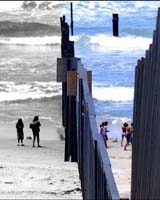
Artists, scholars, and cultural activists from Europe, Mexico, and the United States convene in Los Angeles-home to migrants, refugees, and exiles from all over the world-to share their respective experiences with and approaches to border issues. In an age of increased border militarization, how might we redefine borderlands as zones of mutual intermingling, co-existence, and dialogue? Made possible by special funding from the Polish Ministry of Culture and National Heritage, part of the 2011 Milosz Year
Krzysztof Czyzewski is a social activist, theater producer, essayist, and publisher, and the founder and director of the Borderland Foundation (Fundacja Pogranicze) in Sejny, Poland (near Poland's border with Lithuania). The Borderland Foundation, founded in 1990, is an innovative institution devoted to memorializing, rebuilding, and sustaining the rich cultural diversity in Central and Eastern Europe that was nearly destroyed by two world wars. Czyewski also founded the Borderland Center of Arts, Cultures, and Nations, which comprises a school, several studios, an archive, and a café as well as Borderland Publishing House (Wydawnictwo Pogranicze) and the magazine Krasnogruda--named after Czeslaw Milosz's family's manor nearby (a house that the Borderland Foundation recently dedicated as the home of its new International Dialogue Center). Czyzewski's own manifesto, The Path of the Borderland, was published in 2001.
Dorit Cypis is an award-winning visual artist as well as a professional mediator. Her explorations on identity as psychological and political, individual and collective, have been presented at museums and public venues internationally since 1980. Foreign Exchanges, founded by Dorit in 2007, is an initiative offering tools for conflict engagement and relationship building by blending tools of aesthetics and conflict transformation. Her mediation practice includes Public Dialogue forums, training, and conflict- coaching. She is a Founding Member, Mediators Beyond Borders and Chair/MBB Middle East Initiative, 2008-10, guiding mediators to critically review a mediation curriculum being developed in Israel for conflict engagement between Palestinian and Jewish Israelis.
Josh Kun is a professor in the Annenberg School for Communication and Journalism at the University of Southern California where he also directs The Popular Music Project of The Norman Lear Center. His research focuses on the arts and politics of cultural connection, with an emphasis on popular music, the cultures of globalization, the US-Mexico border, and Jewish-American musical history. He is the author of Audiotopia: Music, Race, and America, co-author of And You Shall Know Us By The Trail of Our Vinyl: The Jewish Past As Told By The Records We've Loved and Lost, and co-editor of the Duke University Press book series Refiguring American Music.
Rubén Martínez is an author, teacher and performer. He is the author of a trilogy of books on immigration and globalization: The Other Side: Notes from the New L.A., Mexico City and Beyond; Crossing Over: A Mexican Family on the Migrant Trail and The New Americans: Seven Families Journey to Another Country. He holds the Fletcher Jones Chair in Literature & Writing at Loyola Marymount University. He has been active in the spoken word and performance scenes for over two decades, and as a musician has recorded with such acts as Los Illegals, Concrete Blonde and The Roches.
Dr. Ofelia Zepeda is Tohono O'odham, born and raised in Stanfield, Arizona. She is currently a Regents' Professor of Linguistics at the University of Arizona where she works on the O'odham language and on language issues. Dr. Zepeda is also a poet writing in both O'odham and English, and the author of three books for poetry. She directs the American Indian Language Development Institute (AILDI) hosted by the U of A. Throughout her long career she has been a strong advocate for Native American education and Native American educators.
Marcos Ramírez ERRE was born in 1961 in Tijuana, Mexico; he is considered one of the preeminent artists in the region, and the senior figure in the burgeoning Tijuana artist community. He creates large-scale public installations informed by a political and social consciousness and is a longtime explicator and arbiter of the cross-border dialogue. In his work, ERRE brings a poetic sensibility to the physical, economic, linguistic, and cultural boundaries that separate people. He has exhibited in one-person shows in the United States and Mexico; was represented at the Biennial São Paulo-Valencia: Encuentro entre dos mares in Valencia, Spain, the 2007 Moscow Biennale, and the VII and VI Habana Bienal in Cuba; and showed at the 2000 Whitney Biennial in New York. He has been included in several important group exhibitions and is a recipient of a 2007 United States Artist Fellowship award and grant from the Fondo Nacional para la Cultura y las Artes, Mexico.
